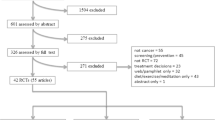Abstract
Breast cancer survivors have specific healthcare needs. As a result of their disease and treatment, they have to adapt to different physical and psychosocial late effects. Unfortunately, several studies have documented insufficiency in the survivorship healthcare system. The aim of this paper was to describe the process of development and testing of a novel Cancer Self-management Education programme (CSME programme) to improve patient-reported self-management and self-efficacy for patients with breast cancer who were at the end of primary treatment. The development of the educational programme was inspired by the Plan-Do-Study-Act (PDSA) circle and based on person-centred principles. It was conducted at a Danish university hospital. Nine oncology healthcare providers, two external experts in patient education and five patients were involved in the development and testing of the education programme. Implementation of dialogue-based tools was used as an educational learning instrument in the SCME programme. The PDSA approach to the development of the CSME programme resulted in a person-centred programme that could improve self-management and self-efficacy in the survivorship phase of patients with breast cancer.

Similar content being viewed by others
References
Fiszer C, Dolbeault S, Sultan S, Brèdart A (2014) Prevalence, intensity, and predictors of the supportive care needs of women diagnosed with breast cancer: a systematic review. Psycho Oncol 23:361–374. https://doi.org/10.1002/pon.3432
Ewertz M, Jensen AB (2011) Late effects of breast cancer treatment and potentials for rehabilitation. Acta Oncol 50:187–193. https://doi.org/10.3109/0284186X.2010.533190
Hewitt M, Greenfield S, Stovall E. From cancer patient to cancer survivor: lost in transition. National Academies Press 2006. http://www.nap.edu/catalog/11468.html. [Accessed 12. November 2015]
Ellegaard MB, Grau C, Zachariae R, Bonde Jensen A (2017) Fear of cancer recurrence and unmet needs among breast cancer survivors in the first five years. A cross-sectional study. Acta Oncol 56(2):314–320. https://doi.org/10.1080/0284186X.2016.1268714
Opfølgningsprogram for Brystkræft. Sundhedsstyrelsen, februar 2015. [Program for breast cancer follow-up. The Danish Health Authority, February 2015]. http://sundhedsstyrelsen.dk/da/udgivelser/2015/*/media/955CE1F4367543219BCA03B59005ADDA.ashx. [Accessed 12. November 2015]
DH, Macmillan Cancer Support & NHS Improvement. National Cancer Survivorship Initiative Vision. 2010. http://www.ncsi.org.uk/wp-content/uploads/NCSI-Vision-Document.pdf. [Accessed 12. November 2015]
Lev E (1997) Bandura’s theory of self-efficacy: applications to oncology. Res Theory Nurs Pract. 11(1):21–37 discussion 39-43
Lev E, Daley K, Connor N, Reith M, Fernandez C, Owen S (2001) An intervention to increase quality of life and self-care self-efficacy and decrease symptoms in breast cancer patients. Res Theory Nurs Pract 15(3):277–294
Lorig K, Sobel D, Ritter P, Laurent D, Hobbs M (2001) Effect of a self-management program on patients with chronic disease. Eff Clin Pract 4(6):256–262
Foster C, Fenlon D (2011) Recovery and self-management support following primary cancer treatment. Br J Cancer 105(Suppl 1):S21–S28
Barlow J, BancroftG TA (2005) Self-management training for people with chronic disease: a shared learning experience. J Health Psychol 10(6):863–872
Berwick DM (1998) Developing and testing changes in delivery of care. Ann Intern Med 128:651–656
Provost LP, Norman CL, Nolan TW, Nolan KM, Moen RD, Langley GJ (2009) The improvement guide: a practical approach to enhancing organizational performance, second edn. Jossey-Bass, San Francisco
Greenhalgh T, Robert G, Macfarlane F, Bate P, Kyriakidou O (2004) Diffusion of innovations in service organizations: systematic review and recommendations. Milbank Q 82:581–629. https://doi.org/10.1111/j.0887-378X.2004.00325.x
Damschroder LJ, Aron DC, Keith RE, Kirsh SR, Alexander JA, Lowery JC (2009) Fostering implementation of health services research findings into practice: a consolidated framework for advancing implementation science. Implement Sci 4:50. https://doi.org/10.1186/1748-5908-4-50
Torenholt R, Engelund G, Willaing I (2015) Bringing person-centeredness and active involvement into reality: the feasibility of a participatory concept for patient education. Health Edu 115:518–533
Steno Diabetes Center. In balance with chronic illness: tools for patient education. http://steno.dk//media/Documents/sundhedsprofessionelle/vaerktojer/balance/rapporter/IN_BALANCE_Book_WEB-2014_UK.ashx?la=en [Accessed 12. February 2015]
Bandura A (2001) Social cognitive theory: an agentic perspective. Annu Rev Psychol 52:1–26
Pajares (2002). Overview of social cognitive theory and of selfefficacy. Retreived june 12, 2015, from http://www.emory.edu/EDUCATION/mfp/eff.html
Mattelmaki T (2005) Applying probes—from inspirational notes to collaborative insights. CoDesign 1:83–102. https://doi.org/10.1080/15719880500135821
Crabtree A, Hemmings T, Rodden T, et al. Using Probes as Exploratory Devices in Care Settings. 2003 [database on the Internet] http://bscw.cs.ncl.ac.uk/pub/nj_bscw.cgi/d50067/Crabtree,%20Hemmings,%20Rodden,%20Cheverst,%20Clarke%20and%20Dewsbury-Using%20Probes%20as%20Exploratory%20Devices%20in%20Care%20Settings.pdf. [Accessed 12. February 2015]
Varming AR, Hansen UM, Andresdottir G, Husted GR, Willaing I (2015) Empowerment, motivation, and medical adherence (EMMA): the feasibility of a program for patient-centered consultations to support medication adherence and blood glucose control in adults with type 2 diabetes. Patient Prefer Adherence 9:1243–1253. https://doi.org/10.2147/PPA.S85528
Khunti K, Gray LJ, Skinner T, Carey ME, Realf K, Dallosso H, Fisher H, Campbell M, Heller S, Davies MJ (2012) Effectiveness of a diabetes education and self management programme (DESMOND) for people with newly diagnosed type 2 diabetes mellitus: three year follow-up of a cluster randomised controlled trial in primary care. BMJ 344:e2333
Danish Ministry of Health, The Patients’ Cancer Plan - Cancer Plan IV, 2016. http://www.sum.dk/∼/media/Filer%20-%20Publikationer i pdf/2016/Kraeftplan-IV-aug-2016/Kraeftplan-IV-Patienternes-aug-2016.ashx. [Accessed 12. November 2017]
Center for Patient Experiences and Evaluation, Danish National Survey on Patient Experiences LUP, 2017. https://patientoplevelser.dk/files/dokumenter/filer/LUP/LUP2016/lup 2016 rapport.pdf. [Accessed 12. November 2017]
Author information
Authors and Affiliations
Corresponding author
Rights and permissions
About this article
Cite this article
Ellegaard, MB.B., Jensen, A.B. & Lomborg, K. Development of a Cancer Self-management Education Programme for Women with Breast Cancer at the End of Primary Treatment. J Canc Educ 34, 882–889 (2019). https://doi.org/10.1007/s13187-018-1390-0
Published:
Issue Date:
DOI: https://doi.org/10.1007/s13187-018-1390-0




